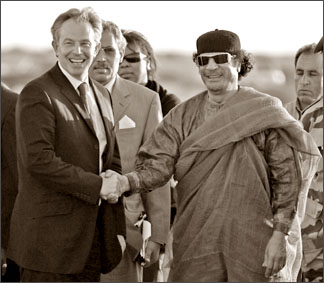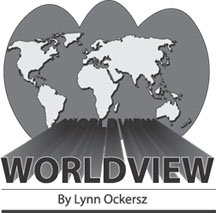Catalysts in reshaping global politics
|

British Prime Minister Tony Blair (L) shakes hands with Libyan
leader Moammar Qadhafi following a two-hour meeting at the Colonel’s
headquarters in Sirte near Tripoli recently. Blair who arrived
Tuesday in Libya at the start of a three-nation African tour less
than a month before he leaves office, emerged from Qadhafi’s tent to
describe their discussions as “positive and constructive.” AFP
|
 The meeting at ambassadorial level between the US and Iran on the
Iraqi issue in Baghdad, no less than the historic handshake between
visiting British Prime Minister Tony Blair and Libyan leader Moammar
Gadhafi in Sirte, Libya, could be considered two recent breakthrough
events which could re-shape international politics in a positive
direction. The meeting at ambassadorial level between the US and Iran on the
Iraqi issue in Baghdad, no less than the historic handshake between
visiting British Prime Minister Tony Blair and Libyan leader Moammar
Gadhafi in Sirte, Libya, could be considered two recent breakthrough
events which could re-shape international politics in a positive
direction.
Beginning with the US - Iran meet between US Ambassador to Iraq Ryan
Crocker and his Iranian counterpart, Hassan Kazemi Qumi, it is crucially
significant that the parties have called for a "secure, stable,
democratic, federal Iraq, in control of its own security and at peace
with its neighbours".
This could be considered a solid policy plank for the two sides to
build on because it is apparent that both parties are exceedingly
sensitive to any "external interference" in Iraqi affairs. The US side
has reportedly raised concern over what it sees as Iranian backing for "Shia
gunmen" in Iraq and called for unity of purpose by Iran in Iraq, now
that Iran has called for a Iraq which is both democratic and stable and
fully in control of its security. While reportedly expressing his
satisfaction over Iran's support for an independent Iraq, Crocker had
called for a unified Iranian policy where there would not be any
military or moral backing for armed, Shia groups which are also
instrumental in fuelling a civil war situation in Iraq.
This issue would prove intractable in any future negotiations. What
is seen by the West as external interference in Iraq would cease only to
the degree to which the US - led military presence in Iraq is scaled
down. Therefore, in the absence of concrete, troop withdrawal plans by
the US, what is considered external involvement in Iraq could not be
expected to diminish because the US military presence in Iraq triggers
threat perceptions in Iraq's neighbours, besides helping in fuelling the
bloodletting in Iraq.
Nevertheless, these initial talks between the US and Iran need to be
welcomed on account of the key positions they hold as proponents of
conflicting ideologies which are instrumental in the formation of a
principal polarity in global politics. That is, the current stand off
between what is loosely termed liberal democracy and Islam - based
politics. Any degree of understanding between these sides could result
in a reduction of global political and military tensions.
Ambassador Qumi's suggestion at the talks that the sides consider a
'Trilateral security mechanism', featuring the US, Iran and Iraq, to
bring stability to Iraq, could prove useful because, the mechanism would
not only institutionalize cooperation between the sides but tie them to
agreements and commitments on helping Iraq.
Meanwhile, British Premier Tony Blair's cordial talks with Libyan
leader Moammar Gadhafi could be considered a stitch in time in further
de-escalating global political tensions. Libya has apparently learnt the
hard way that a rapprochement with the West is probably best from the
point of view of gaining from economic globalization.
To gain steadily from the latter process Libya needs to diminish its
relative international isolation and it is doing just that by opening-up
to the West.
To facilitate this rapprochement, Libya has shelved its nuclear
ambitions and this had led to closer economic interaction between Libya
and Britain, for instance, with British Petroleum already making oil
exploration moves in Libya. Many more Western firms are reportedly
joining the 'oil rush'.
The 'oil rush' is perhaps an initial indication that Libya is seeking
a share of affluence from economic liberalization, both internally and
externally.
Libya has been a frontline state in politicized Islam's confrontation
with the West and the fact that it is in a bid to ease such tensions
presages reduced tensions in global politics.
[email protected]
|
